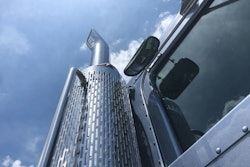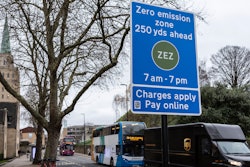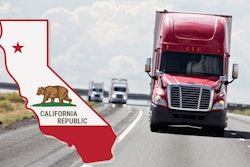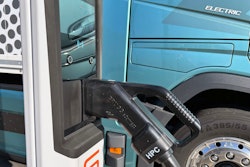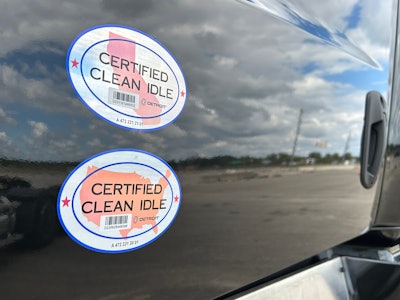
Nebraska Attorney General Mike Hilgers has filed an antitrust lawsuit against some of the nation’s largest heavy-duty truck manufacturers alleging a plot to stifle the availability of internal-combustion semi-trucks in favor of electric ones.
In the lawsuit filed Nov. 19, Hilgers said California and the California Air Resources Board have "recently embarked on a mission to eliminate the [internal combustion engine] vehicle and mandate the electrification of our nation’s vehicle fleet.”
“Internal-combustion trucks account for 99.9% of all heavy-duty vehicle sales,” the lawsuit says. “Yet a series of California regulations phases out those trucks -- regardless of consumer preference or continued improvements available to ICE vehicles or liquid fuels. And as soon as 2036, those regulations outright ban California truck manufacturers from selling heavy-duty vehicles with internal-combustion engines. That looming deadline is felt today.”
While other lawsuits have been filed against California and CARB attempting to halt or slow down the regulations, including one led by Hilgers to block CARB’s Advanced Clean Fleets regulation, Hilgers’ new lawsuit targets manufacturers themselves, including Daimler Truck North America (DTNA), International Motors, Paccar, Volvo Group North America, and the Truck & Engine Manufacturers Association.
As of Thursday morning, Paccar and International Motors have declined to comment on the lawsuit. DTNA said it is still reviewing the situation and cannot comment further at this time. Others named in the suit have not yet responded to requests for comment. This story will be updated with additional comments when they are made available.
“Rather than push back or simply compete in the marketplace, heavy-duty truck manufacturers colluded to sign an agreement called the ‘Clean Truck Partnership (CTP),’” Hilgers said in a press release. “The agreement commits the signatory manufacturers not to oppose additional state-level electric-truck mandates and to restrict output of diesel-powered semi-trucks in lockstep, even if a court rules that the regulations are unlawful.”
[Related: CARB, truck and engine OEMs enter partnership to meet clean air goals]
Hilgers’ lawsuit calls the Clean Truck Partnership “nakedly anti-competitive,” adding that it “represents an industry-wide commitment by companies to reduce their output of ICE vehicles and eliminate consumer choice, which will drive up prices for those same vehicles in Nebraska and elsewhere to subsidize the so-called ‘transition’ to ZEVs.” Additionally, the lawsuit claims that “the OEMs’ broad promise to follow CARB’s regulations in other states that purportedly ‘will’ adopt them, and to not oppose any such out-of-state proposals, reflects the OEMs’ intention to reduce output and raise prices in states that have not and may never adopt such regulations, including Nebraska.”
Hilgers highlighted the importance of the trucking industry in Nebraska and beyond, adding that he'll continue to fight policies that threaten the industry.
“The logistics industry is a foundational piece of Nebraska’s economy -- from employing thousands of Nebraskans to ensuring that Nebraska’s agriculture and liquid fuel products can get to purchasers around the country and world,” Hilgers said in announcing the lawsuit. “Whether it is California or collusive corporations, I will continue to fight misguided and anti-democratic policies that threaten to devastate Nebraska’s trucking and biofuel industries, raise prices for consumers, and impact jobs across Nebraska and the country.”
The lawsuit seeks a judgement and declaration that the named defendants have violated the Nebraska Consumer Protection Act and that the CTP violates the antitrust laws of Nebraska and is, therefore, null and void in the state. The lawsuit also seeks a permanent injunction to block the defendants from reducing their output of Class 8 ICE vehicles in Nebraska pursuant to the CTP, from raising prices for Class 8 ICE trucks as a result of the CTP agreement, and from coordinating activity or taking any action pursuant to the CTP in Nebraska.
Finally, the lawsuit asks the court to declare the CTP null and void nationwide "because it will injure Nebraska residents and violate Nebraska antitrust laws if defendants comply with it in other states.
In addition to Nebraska, the Energy Marketers of America and Renewable Fuels Nebraska joined as co-plaintiffs in the lawsuit against the manufacturers.
[Related: States challenge latest EPA, CARB truck emissions rules]
ATA follows lawsuit with call for OEMs to abandon CARB partnership
A day after Hilgers’ lawsuit was filed, American Trucking Associations President and CEO Chris Spear penned a letter to Cummins, DTNA, International Motors, Paccar and Volvo Trucks North America urging the manufacturers to abandon the Clean Truck Partnership and instead work with their customers on achieving climate goals.
“The sustainability goals of your companies reflect our industry’s core values and shared mission to deliver emissions reductions through achievable national regulations,” Spear said. “Unfortunately, regulators continue to divide our industry to advance a political agenda. This was evident in last summer’s agreement between the California Air Resources Board and your companies through the Clean Truck Partnership (CTP).”
Spear went on to say that the agreement to abide by California’s regulations, even if struck down in court, “constituted an abandonment of your customers and threatened to undermine our industry’s shared desire for one national standard.
“By strong-arming our industry into unachievable targets and timelines void of operational and economic reality, CARB’s mad dash to zero has set our industry up for failure, sowing the seeds of another supply chain crisis,” Spear added. “Not surprising to any of us, California’s ideological approach has cratered the truck market; sales are down by over 50% compared to last year. Availability of California-certified diesel engines are hard to come by and expensive, rationed due to zero-emission truck sales requirements.”
Spear's viewpoint in some ways echoed that of the Western States Trucking Association, whose government affairs director Joe Rajkovacz cast the CARB/truck makers' CTP this way: "The OEMs made an agreement with CARB and choose to ignore their customers as well as associations who are suing to derail the ZEV mandate. The OEMs invested in producing ZEV vehicles, and at the least they want their R&D money back, so they are trying to forcefeed their customers something they don’t want at this time," Rajkovacz wrote. "They are giving up sales of diesel trucks as part of a gambit to force ZEVs on customers not suited to early ZEV adoption, nor required to adopt them."
Rajkovacz similarly heaped blame on CARB, too, particularly the board's rigidity holding fast to its new Advanced Clean Trucks regs. Rajkovacz predicted the rigidity would ultimately "actually hurt air quality improvements due to truck owners basically being forced to keep older trucks or go purchase later model used trucks," mostly out-of-state, given availability issues.
Spear highlighted Hilgers’ lawsuit over the CTP, noting that it would allow the OEMs “to abandon the CTP immediately and work in solidarity with the industry to deliver commonsense solutions. The shifting political landscape creates an opportunity for the industry to work with the incoming Trump Administration to course correct the impossible timelines and stringency targets laid out by California and the Environmental Protection Agency.”
Spear said this can be achieved by leveraging existing near-zero technology and “requires a joint agreement that, as an industry engaged in interstate commerce, we need uniform national standards free of conflicting state policy to achieve regulatory certainty and success.”
[Related: Trucking groups, fleets urge EPA to deny waiver for CARB's diesel ban]


